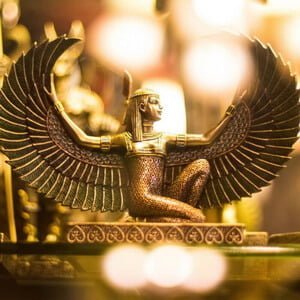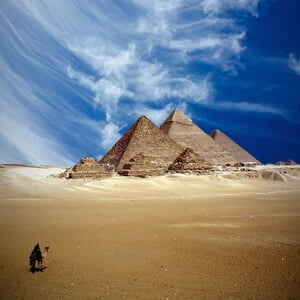Ancient Egyptian Civilization: Overview
When did the ancient Egyptian civilization start?
At its peak, the ancient Egyptian civilization lasted more than 3000 years. It was one of the most powerful and famous civilizations in history.
Ancient Egypt had a vast empire that stretched from Syria in the north to Sudan in the south. Still, it existed long before it was an empire.
Ancient Egypt was a collection of tiny autonomous city-states that grew around the Nile River in North Africa.

Beginning of Egyptian civilization
By around 3100 BC, the city-states were separated into two sections and designated according to the flow of the Nile:
Upper Egypt in the south, which was upstream, and lower Egypt in the north, which was downstream.
The two sides unified, resulting in one Egyptian state that lasted millennia.
It is possible to divide civilization’s dominance into;
three distinct and significant periods of prosperity, known as the “old, middle, and new kingdoms,” and two periods of instability, known as the “first and second intermediate periods.”
Pharaoh meaning
The Egyptian word pharaoh, meaning “great house,” was never the official name of the king or queen but was later linked to the head of state because of its use in sacred texts.
There were around 300 pharaohs who governed the Egyptians in succession.
These rulers, who were not always male or Egyptian, were seen as the people’s protectors and divine liaisons between humanity and the hundreds of gods they worshipped.
After the rulers died, the ancient Egyptians thought they were transformed into gods to prepare for their voyage into the afterlife.
Ancient Egyptian tombs
The rulers built elaborate tombs, including the Great Pyramids of Giza and underground mausoleums in the Valley of the Kings. The rulers filled their graves with everything they could need in the afterlife, including gold jewelry, food, drink, and even pets, in preparation for this journey to the gods. It also included mummifying one’s body. The deceased’s body was embalmed and wrapped in hundreds of meters of linen before being put in the tomb, where it will be reanimated in the coming years.
Structures like the Great Pyramids are testaments to the significance of religion in the lives of ancient Egyptians. Still, they also embody the Egyptian people’s inventiveness and cultural strength.
Ancient Egyptian mathematics
Advances in mathematics and written language, in particular, pushed their civilization to prosperity. Math, especially measurement, Mathematics let the Egyptians comprehend and harness their world via numbers as no other culture had before them. They invented a new method of measurement known as the qubit, which was utilized to construct gigantic monuments such as the Great Pyramid with great geometrical perfection.
The Egyptians also calculated time by integrating mathematics and astronomy; they devised a 24-hour division to the day and constructed the first solar calendar in history, with 365 days in one year.
Finally, the Egyptians created ways for measuring and surveying the land surrounding the Nile River. These civil engineering marvels paved the way for the development of dams, canals, and irrigation systems, which improved farming and agriculture in the Nile Valley and also applied mathematical principles.

Ancient Egypt writing
The ancient egyptian civilization developed written languages to describe their surroundings. The earliest and best-known of these is hieroglyphic writing, established approximately 3150 BC under the old dynasty and comprising over 700 pictorial characters. It was used to inscribe monuments and pots and mostly had a decorative or ceremonial function.
Soon, another ancient style of writing known as hieratic emerged from the hieroglyphic system. It was a type of cursive written in ink with a more practical purpose than its formal predecessor.
Another ancient Egyptian discovery was written in Hieratic. Papyrus was a paper derived from the papyrus plant, which grew abundantly along the Nile. This medium provided the ancient Egyptians with a new avenue of communication and record-keeping,
allowing their civilization’s administrative skills to develop and their culture to spread for thousands of years.
When did the Egyptian empire end?
Like other great civilizations, ancient Egyptian civilization was finally defeated following a series of invasions, notably those by the Persian Empire in the 4th century BC and the Roman Empire in about 30 BC.
Not many civilizations can boast a lifespan of over 3000 years, let alone one that made vast cultural contributions still felt in modern times.
Ancient Egypt set a high standard for all other civilizations with its innovations in language and math, spirituality and religion, and political and military power.



